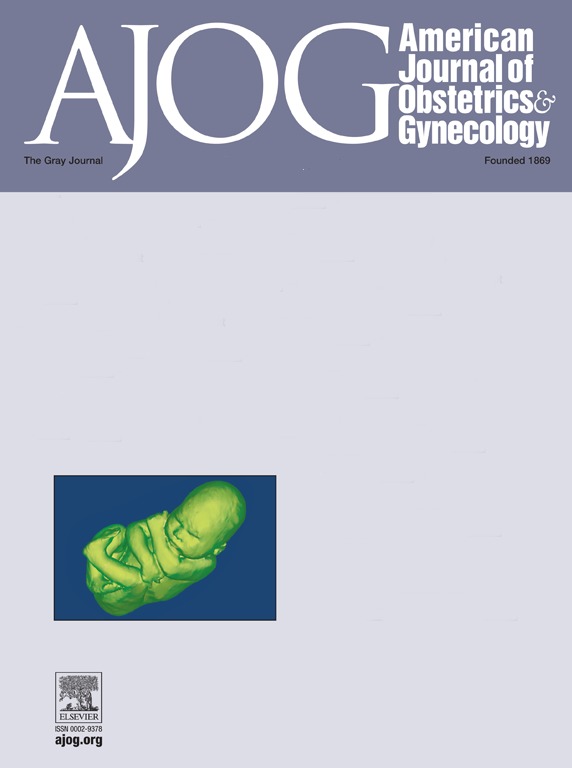Hydroxychloroquine in Systemic Lupus Erythematosus, Anti-SSA/SSB, and Antiphospholipid Antibody-Positive Pregnancies.
IF 8.4
1区 医学
Q1 OBSTETRICS & GYNECOLOGY
引用次数: 0
Abstract
Pregnancies in patients with systemic lupus erythematosus (SLE) and those positive for anti-SSA/SSB or antiphospholipid antibodies carry a heightened risk of adverse pregnancy outcomes (APOs), including preeclampsia, preterm birth, and congenital heart block. Among available therapies, hydroxychloroquine (HCQ) plays a pivotal role due to its immunomodulatory and antithrombotic properties, which may help improve pregnancy outcomes. Emerging evidence supports HCQ's role in reducing SLE flares, as well as lowering the recurrence risk of congenital heart block in anti-SSA/SSB-positive pregnancies. Additionally, in patients with antiphospholipid antibodies, HCQ may serve as an adjunctive therapy to mitigate obstetric complications, particularly in refractory cases. Despite early concerns about teratogenicity, large cohort studies and international guidelines affirm HCQ's safety at standard doses (≤400 mg/day), with no consistent association with congenital malformations. Recent research suggests that subtherapeutic HCQ blood levels during pregnancy may correlate with higher maternal disease activity and adverse pregnancy outcomes ,though their primary utility currently lies in identifying nonadherence. Given the heightened risk of pregnancy complications in this population, a clear understanding of HCQ's essential role is crucial for both patients and their multidisciplinary care teams. This review provides up-to-date information on HCQ in pregnancy to help guide clinical decision-making.羟氯喹在系统性红斑狼疮、抗ssa /SSB和抗磷脂抗体阳性妊娠中的作用。
系统性红斑狼疮(SLE)患者和抗ssa /SSB或抗磷脂抗体阳性的妊娠患者发生不良妊娠结局(apo)的风险较高,包括先兆子痫、早产和先天性心脏传导阻滞。在现有的治疗方法中,羟氯喹(HCQ)发挥关键作用,由于其免疫调节和抗血栓特性,这可能有助于改善妊娠结局。新出现的证据支持HCQ在减少SLE发作中的作用,以及降低抗ssa / ssb阳性妊娠中先天性心脏传导阻滞的复发风险。此外,对于有抗磷脂抗体的患者,HCQ可以作为一种辅助治疗来减轻产科并发症,特别是在难治性病例中。尽管早期对致畸性存在担忧,但大型队列研究和国际指南确认,在标准剂量(≤400mg /天)下,HCQ是安全的,与先天性畸形没有一致的关联。最近的研究表明,妊娠期间亚治疗HCQ血水平可能与较高的孕产妇疾病活动性和不良妊娠结局相关,尽管其主要用途目前在于识别不依从性。鉴于这一人群妊娠并发症的风险增加,对HCQ的重要作用的清晰认识对患者及其多学科护理团队都至关重要。本综述提供了妊娠期HCQ的最新信息,以帮助指导临床决策。
本文章由计算机程序翻译,如有差异,请以英文原文为准。
求助全文
约1分钟内获得全文
求助全文
来源期刊
CiteScore
15.90
自引率
7.10%
发文量
2237
审稿时长
47 days
期刊介绍:
The American Journal of Obstetrics and Gynecology, known as "The Gray Journal," covers the entire spectrum of Obstetrics and Gynecology. It aims to publish original research (clinical and translational), reviews, opinions, video clips, podcasts, and interviews that contribute to understanding health and disease and have the potential to impact the practice of women's healthcare.
Focus Areas:
Diagnosis, Treatment, Prediction, and Prevention: The journal focuses on research related to the diagnosis, treatment, prediction, and prevention of obstetrical and gynecological disorders.
Biology of Reproduction: AJOG publishes work on the biology of reproduction, including studies on reproductive physiology and mechanisms of obstetrical and gynecological diseases.
Content Types:
Original Research: Clinical and translational research articles.
Reviews: Comprehensive reviews providing insights into various aspects of obstetrics and gynecology.
Opinions: Perspectives and opinions on important topics in the field.
Multimedia Content: Video clips, podcasts, and interviews.
Peer Review Process:
All submissions undergo a rigorous peer review process to ensure quality and relevance to the field of obstetrics and gynecology.

 求助内容:
求助内容: 应助结果提醒方式:
应助结果提醒方式:


